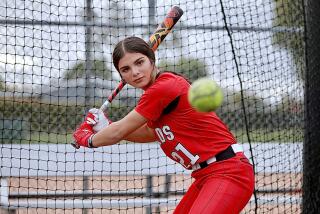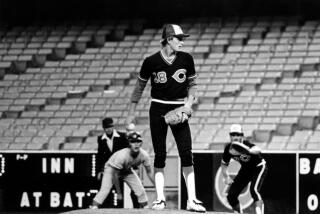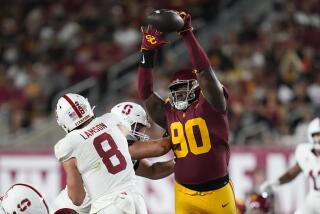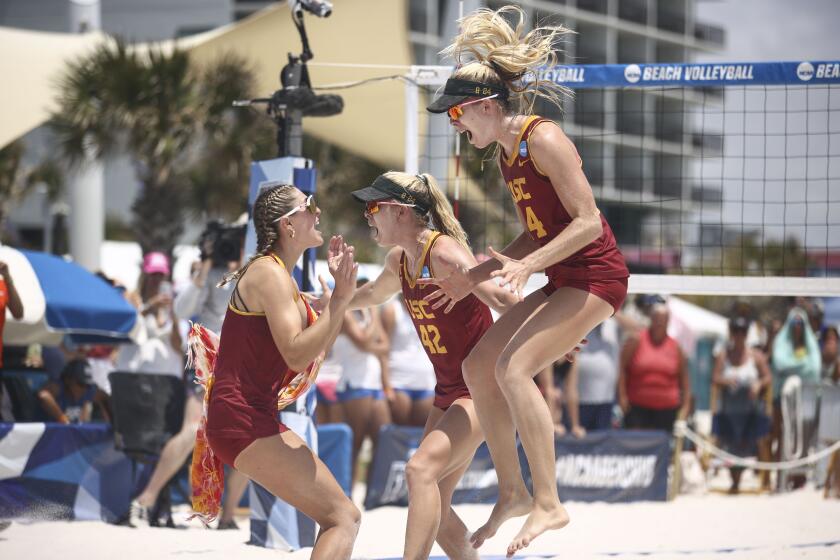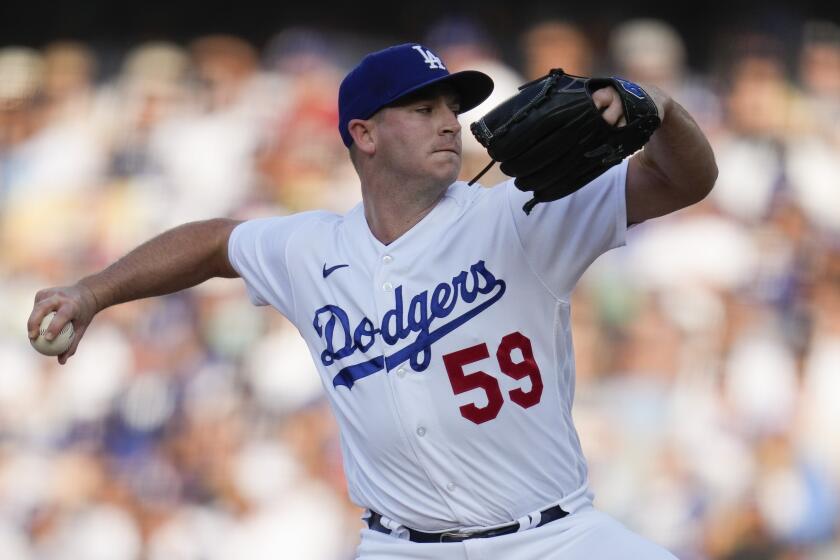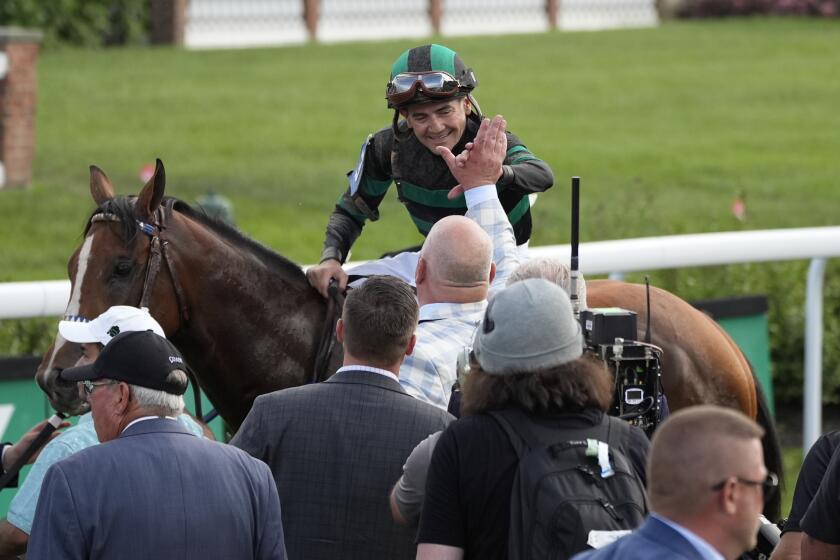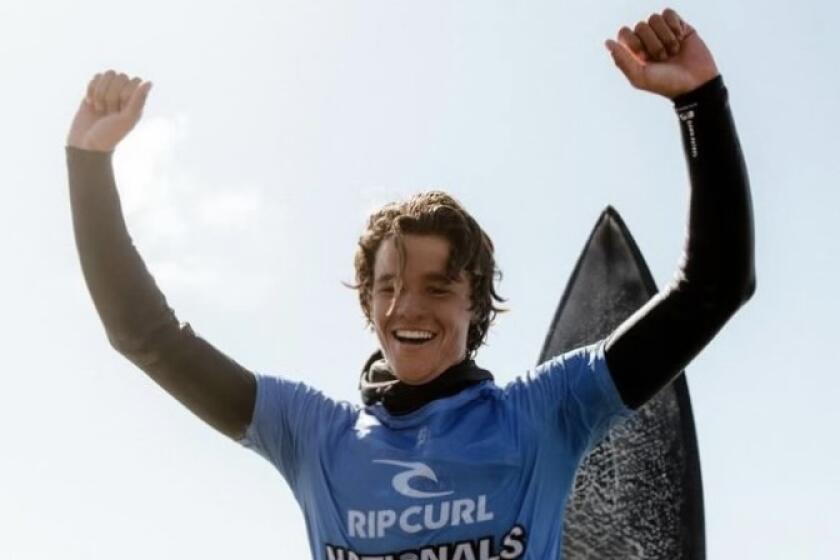Mitch Mustain’s journey takes him back to baseball
GLENDALE, Ariz. — Mitch Mustain stands alone on the pitcher’s mound and paws the dirt with his cleats.
It has been eight long years since he gripped a baseball in a competitive setting. Nearly six since the former football star embarked on one of the most high-profile and enigmatic athletic odysseys in college sports history. Almost two since his last shot at being a sports hero.
In Arkansas, Mustain became one of the most decorated high school quarterbacks ever to throw a pass; his two impressive seasons of high school baseball were a mere footnote.
As a senior in 2005, he led Springdale High’s undefeated football team to a state title. Gatorade, USA Today and Parade magazine named him the national player of the year. A future in college and pro football seemed assured.
Yet he played only one polarizing season at his home state university before transferring in 2007 across the country to USC — where his football career stalled.
Most of his playing time as a Trojan came as the holder for kicks. But his record-setting past, and seemingly unlimited potential, made him the sport’s most recognizable backup, an object of curiosity who rarely left the bench.
A year after he graduated from USC with a degree in international relations, he finds himself in the Arizona desert on barren back fields. The 24-year-old Mustain, wearing a No. 21 gray and black Chicago White Sox jersey, is training and practicing baseball fundamentals. He plays catch, fields bunts and tinkers with pitching mechanics he last used as a 16-year-old.
He is attempting a crossover to a sport he did not play in college, a feat few have achieved at the pro level.
“He’s going to find it’s not as easy as it looks sometimes,” says Larry Owens, one of his coaches. “But that’s part of it. That’s part of the development process.”
Mustain understands. The chaotic nature of football makes a quarterback’s every throw slightly different from the one before. In baseball, a pitcher’s delivery must be consistent, pitch after pitch.
“It seems like it would be easier,” Mustain says, comparing pitching a baseball with passing a football, “but it’s not.”
For Mustain, nothing has come easy, at least not for a while.
::
Last winter, Mustain ran errands at a friend’s car dealership and trained at a Springdale gym managed by J.T. Baker, a part-time White Sox scout. Baker remembered Mustain’s fastball from high school, before a broken arm suffered during his junior football season put any baseball aspirations on hold. Baker arranged for a tryout in front of his boss.
Wearing USC sweats and tennis shoes and carrying a mitt, Mustain showed up at a University of Arkansas bullpen, not far from the football stadium where he was cheered six years before.
Baker took a radar gun and stood behind the catcher, not knowing what to expect. Mustain’s first pitch registered 89 mph, and the scouts silently nodded at each other.
The next one hit 90.
“That’s when he went and got his video camera,” Baker says of his boss.
The video and accompanying report made its way to Chicago, where White Sox executives approved signing Mustain.
He arrived in March at Camelback Ranch, the Glendale spring-training facility the White Sox share with the Dodgers. After baseball season opened in April, he was among a few dozen prospects kept behind for what’s called extended spring training.
For seven hours a day, six days a week until mid-June, the players lift weights, practice and play games against hopefuls from other teams — often in 100-degree heat — as they wait for assignment to low-rung minor league clubs.
“The hardest part,” Mustain says, citing baseball’s slow pace, “is dealing with the tempo.”
The 6-foot-2, 225-pound Mustain had signed a contract to play this spring for the Georgia Force of the Arena Football League. The unexpected baseball audition led him to put his football career on hold.
“This is a growth opportunity for me,” he says.
The White Sox did not give Mustain a signing bonus. He earns about $1,150 a month before taxes, nearly $200 less than his stipend at USC and millions less than an NFL quarterback.
::
Mustain had one chance at glory, one real opportunity to display his talent in a game while at USC.
It came four years after his star-crossed freshman season at Arkansas in 2006, which ended with Mustain unbeaten in eight starts but benched for the final five games because of a feud among coaches, one of whom had been his high school coach. Mustain became a lightning rod for Razorbacks fans angered by the tumult and other controversies that engulfed the program.
“It was dark,” Mustain says. “It wasn’t fun.”
He sought a new beginning at USC, where the starting quarterback job had become the most glamorous position in college football. But Mark Sanchez beat him out for the starting role in the spring of 2008. A year later, after Sanchez bolted to the NFL, freshman phenom Matt Barkley’s arrival kept Mustain on the bench.
But on Nov. 27, 2010, with Barkley sidelined because of an ankle injury, Mustain started for the only time in his USC career.
A victory would extend USC’s eight-game winning streak against Notre Dame, etch Mustain’s name into Trojans lore and keep him on the radar of NFL scouts.
The Trojans trailed, 20-16, late in the fourth quarter. With 85,000 fans in the Coliseum and a national television audience watching, Mustain took the snap, calmly dropped back and spied receiver Ronald Johnson streaking past a Notre Dame defender.
Mustain lofted the ball to his wide-open teammate. “The best pass I threw all night,” Mustain says. “A perfect spiral.”
Mustain remembers saying to himself: “Man, that’s a touchdown.”
Except the usually sure-handed Johnson dropped the ball.
A few plays later, Mustain completed a fourth-down pass, positioning the Trojans for another try at a touchdown. Johnson was wide open in the end zone, but Mustain threw instead to a receiver in a crowd of defenders. Notre Dame intercepted the pass.
“You go from ‘could have been the hero’ to goat pretty quick,” he says.
In February 2011, the season was over and a workout for pro scouts loomed. Mustain posted an online ad to sell a prescription drug he had recently stopped using for treatment of an attention deficit disorder.
A buyer responded and Mustain drove to the San Fernando Valley to complete the transaction. Plainclothes police immediately arrested him.
The officers recognized Mustain and peppered him with questions as they drove him to a booking facility.
What’s Pete Carroll like?
How about Lane Kiffin?
“Kind of surreal,” Mustain says.
The Los Angeles City Attorney’s office allowed Mustain to enter a diversion program and no charges were filed. But the incident, on the eve of the NFL draft and eventual free-agent market, wiped out any interest from pro teams.
“If I dwell on it, it could be a sad story,” Mustain says of his unfulfilled football dreams. “It wasn’t by any means a disaster. It’s just the way it went.”
::
On this June afternoon, the temperature pushing the mid-90s, Mustain tugs at the bill of his black cap and peers toward home plate, awaiting a sign from the catcher.
No infielders or outfielders flank him on defense. Shielded by a protective screen behind the pitcher, Owens, the coach, offers feedback as Mustain readies for his brief turn in a simulated game.
Mustain walks the first batter, strikes out the next and gives up a single. He listens intently when Owens suggests he lift his left foot straight up rather than swinging it out before throwing. The next two batters strike out.
It’s the kind of incremental progress Mustain lives for.
“If I can just get to that point where it clicks,” Mustain says, “I think it’s going to work pretty well.”
Ryan Newman, a minor league manager who supervised extended spring training, said a competitive football mentality is a plus for baseball players. He is not worried about Mustain’s absence from the game.
“Quarterbacks are quarterbacks for a reason,” Newman says. “They’re smart kids and they make the adjustment.”
A few days after that simulated game at the White Sox spring-training facility, Mustain was assigned to the team’s Appalachian Rookie League team in Bristol, Va., the organization’s lowest level and about as far from the major leagues as a professional player can be.
On June 19, Mustain pitched two scoreless innings and struck out two in his debut. A few days later, he gave up two runs in less than two innings.
“I’m not worried,” he says. “I know there will be ups and downs.”
Mustain has since appeared in 10 more games, earning a victory and absorbing two losses while pitching 14 innings.
If he progresses, he could beat the odds and earn a future in baseball. But experience has taught him that nothing is guaranteed.
So the former quarterback keeps moving forward.
One pitch at a time.
twitter.com/latimesklein
More to Read
Get our high school sports newsletter
Prep Rally is devoted to the SoCal high school sports experience, bringing you scores, stories and a behind-the-scenes look at what makes prep sports so popular.
You may occasionally receive promotional content from the Los Angeles Times.
